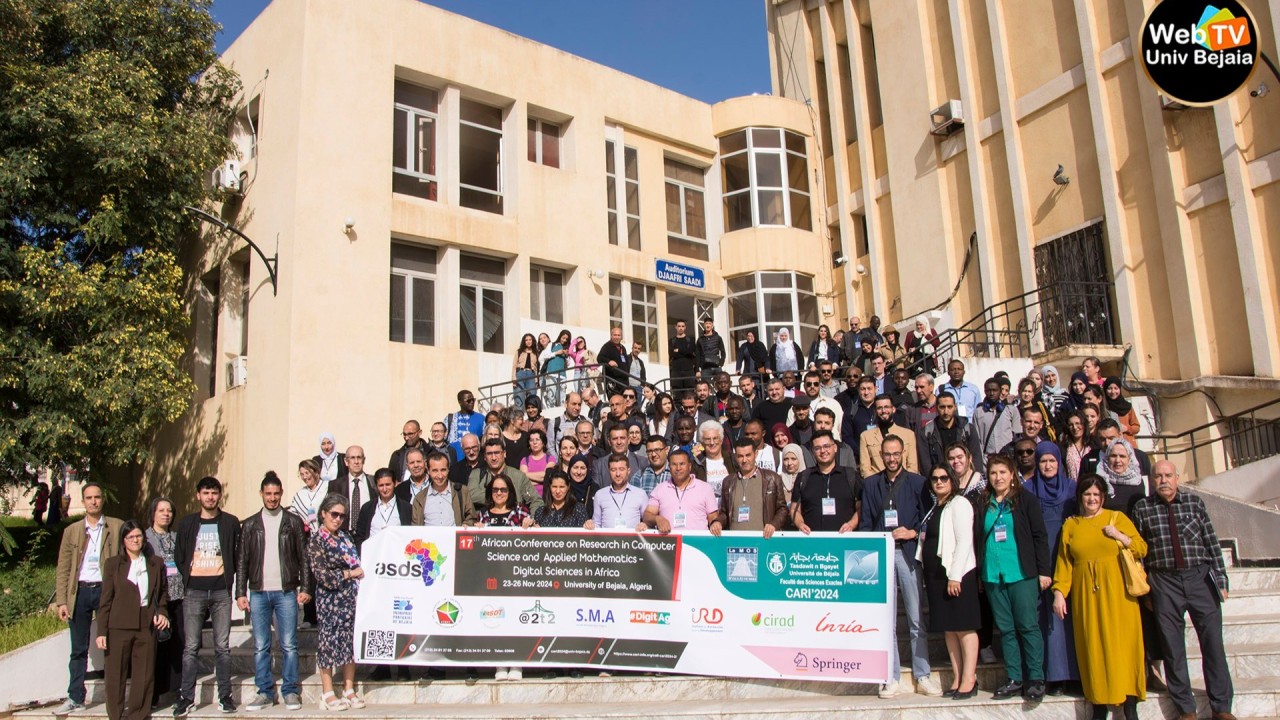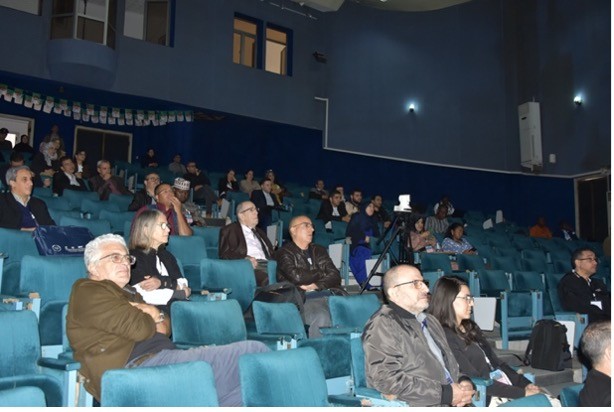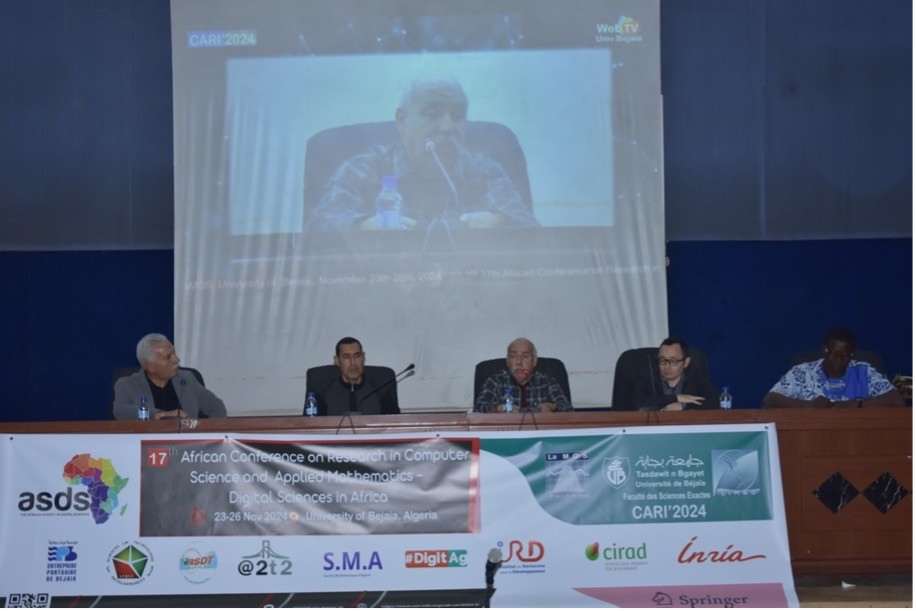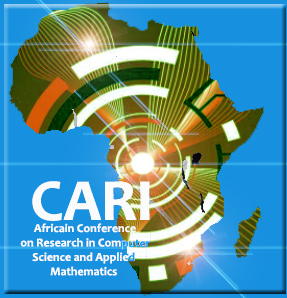Welcome to the CARI 2024 Conference

Thirty-two years ago, mathematicians, computer scientists, specialists in various digital disciplines, and business managers came together in Yaoundé, Cameroon (1992) to ≪ build ≫ the 1st CARI – African Conference on Research in Computer Science and Applied Mathematics. This event emerged from international cooperation between African, European, and international research institutes. Organized every two years since its first edition in Yaoundé in 1992, the CARI is more than just a scientific meeting, it is a dynamic environment of collaboration that brings together researchers and decision-makers in the fields of computer science and applied mathematics.
Since then, CARI has traveled across Africa: Cameroon (1992), Burkina Faso (1994), Gabon (1996), Senegal (1998), Madagascar (2000), Cameroon (2002), Tunisia (2004), Morocco (2008), Ivory Coast (2010), Algeria (DGRSDT, CERIST, ESI, USTHB, CDTA, 2012), Senegal (2014), Tunisia (2016), South Africa (2018),
Senegal (2020), and Cameroon-Tunisia (2022).
The 17th CARI’2024 Conference is taking place in Béjaia (Algeria). It is organized under the auspices of ASDS (African Society in Digital Sciences) in partner- ship with several specialized institutions in Algeria (DGRSDT, ATRST, University of Béjaia, SMA – Algerian Mathematical Society, A2T2 – Algerian Society for Technology Transfer, EPB (Port Enterprise of Béjaia) and internationally INRIA (National Institute for Research in Computer Science and Automation), IRD (Institute of Research for Development), CIRAD (Center for International Cooperation in Agronomic Research for Development), #DigitAg, . . .
The scientific and international reputation of the local organizers (LaMOS Re- search Unit (http://www.lamos.org) and the LIMED Laboratory), was pivotal in selecting Béjaia as the host for this 17th edition. We hope to meet the expectations and challenges of this important event. Indeed, the committees received 210 communi- cation proposals from 28 different countries (including 16 African countries). These submissions were reviewed by a TPC-Technical Program Committee (chaired by Prof. K. Barkaoui, Beït el Hikma Tunis and CNAM Paris), which mobilized 146 reviewers.
The scientific program, which reflects the richness and diversity of research carried out on the African continent in particular, focuses on work likely to contribute to scientific and technological development, environmental awareness and natural re- source management.
The first day of the event (Saturday, November 23) will be dedicated to a work- shop [on international cooperation, led by S. Arnaud, R. M. Ahouandjinou (IFRI, UAC, Benin), Hélène Kirchner (INRIA, France), and César Viho (IRISA, France), and to a specialized workshop, “DAAfrica’2024 – Data Science for Agriculture in Africa”.
coordinated by Paulin Melatagia (University of Yaoundé I) and Mathieu Roche (CIRAD, France), with 40 registered participants. The final day (Wednesday, November 26, 2024) will feature the General Assembly of the ASDS (African Society in Digital Sciences). Additionally, a rich social and cultural program will accompany the scientific event.
The four plenary lectures will be delivered by leading experts (G. Yero – Uni- versity of Cadiz, F. Toumani – CNRS Clermont-Ferrand, H. Sahraoui – University of Montreal), including Professor Salissou Moutari (Queen’s University Belfast, United Kingdom), a graduate of our Operational Research Department at the University of Béjaia (Engineer, class of 2001). This is an opportunity to highlight our institution’s policy toward Africa, initially directed toward the Maghreb in the early 1980s and subsequently toward Sub-Saharan Africa from the 1990s. We take this opportunity to honor the memory of Professor Kwansi Adam (Kumasi University, Ghana), with whom we collaborated as early as 1990 on the SEAM African Conferences (Structural Engineering Analysis and Modeling). The training initiatives of our university even extended to supervising engineering theses on local topics (such as the performance evaluation of the electrical network of Niamey city, for the Nigelec company).
The CARI’2024 Committees extend their gratitude to all those who contributed, directly or indirectly, to ensuring that this 17th edition reflect the scientific and technological advancements of recent years.
Research in Computer Science – 17th African Conference on Research in Computer Science and Applied Mathematics, CARI 2024 Bejaïa, Algeria, November 23–26, 2024, Proceedings
| Published version – Anglais Access restricted to CIRAD agents Use under authorization by the author or CIRAD. Research_in_Computer_Science_CARI2024_Springer.pdf Télécharger (62MB) | Request a copy |
Abstract : This book constitutes the refereed proceedings of the 17th African Conference on Research in Computer Science and Applied Mathematics, CARI 2024, in Bejaïa, Algeria, in November 23-26, 2024. The 25 full papers included in this book were carefully reviewed and selected from 90 submissions. The conference covers a range of subjects, including optimization and heuristics, cluster analysis, reactive systems, information security, natural language and speech processing, computer Vision and image processing, machine learning and deep learning.
Mots-clés libres : Computer science, Data Management Systems, Applied Mathematics, Distributed Systems and Cloud computing, Natural resource management, Networks and protocols, Cryptography, Environmental Awareness, Cyber Security, Technological Development, Safety and Correctness of Systems, Big Data and Data Science, Artificial intelligence, Machine Learning and Deep Learning, Knowledge Discovery and Data Mining, Decision Making under Uncertainty, Information Retrieval, Natural Language Processing, Semantic Web and Linked Data, Ontology
Editeurs scientifiques et affiliations
- Aissani Djamil, Université de Bejaia (DZA)
- Barkaoui Kamel, CNAM (FRA)
- Roche Mathieu, CIRAD-ES-UMR TETIS (FRA)
Table of contents (31 papers)
Natural Gas Consumption Forecasting Based on Weighted Ensemble Learning
Samiha Ait Taleb, Abderrazak Sebaa, Rafik Bouzera, Anais Aksouh, Randa Ladlani, Dalil Hadjout
Machine Learning Trust Prediction Using Localized Nodes Characteristics
Yanni Ammar Khodja, Karim Akilal, Samia Chibani Sadouki
A Data-Driven Wildfire Forecasting: Case Study of Algeria
Naila Aziza Houacine, Habiba Drias, Fethi Azibi, Serine Nada Bendjebbar
Multi-aggregation Strategies in Ensemble-Based Machine Learning and Deep Learning Models for Cough-Based COVID-19 Detection
Takieddine Lombarkia, Farid Marir, Naila Marir
Benchmark Analysis of Time Series Models for Malaria Trends in the Adamawa Region (Cameroon)
Apollinaire Batoure Bamana, Yannick Sokdou Bila Lamou, Alioum Abdoulaye
A Low-Resource Language Dataset: Moore Natural Emotions Speech Dataset
Go Issa Traoré, Borlli Michel Jonas Some
Automatic Pure Speech Files Detection Using MFCC+F0 Features and LSTM Classifier in Multilingual Context for Low-Resource Languages
Go Issa Traore, Borlli Michel Jonas Some
ShipFPN: New Feature Pyramid Network Architecture for Object Detection in High-Resolution Satellite Images: Application to Ship Detection
Mb. Amos Mbietieu, H. M. Tapamo Kenfack, Georges E. Kouamou
New Approach Based on Alliances in Graphs for Image Segmentation: Application to Breast MR Images
Hocine Attoumi, Hachem Slimani, Fatah Bouchebbah
Identification of Non-Plant Elements in Herbarium Images Using YOLO
Youcef Sklab, Hanane Ariouat, Edi Prifti, Jean-Daniel Zucker, Eric Chenin
A Service Composition Engine for Incremental Computation
Joskel Ngoufo Tagueu, Adrián Puerto Aubel, Maurice Tchoupe Tchendji
Expressiveness of the LSAWfP Workflow Language Compared to BPMN
Marionne Daniela Nguedia Momo, Milliam Maxime Zekeng Ndadji, Maurice Tchoupé Tchendji, Franck Bruno Tonle Noumbo
Formal Verification of Deep Learning Matrix Calculus
Razika Lounas, Mohamed Mezghiche
Addressing Input/Output Composition Through Open Automata Representation
Rabéa Ameur-Boulifa, Sarah Chabane Mechiouri
Clustering for Performance Optimization in Vehicular Ad-Hoc NETworks: A Comprehensive Survey
Siham Hadjout, Kahina Ouazine, Mohamed Essaid Khanouche
Functional Sparse Data Clustering Using Conditional Expectation PACE Method
Si-Ahmed Idris, Hamdad Leila, Dabo-Niang Sophie
Hierarchical Sparse Subspace K-Means
Abdoul Wahab Diallo, Mory Ouattara, François Kaly, Ndèye Niang
HW/SW Co-design Implementation of Elliptic Curve Digital Signature Algorithm for Blockchain Network
Nesrine Guenfoud, Mohamed Issad, Mohamed Debyeche
Intrusion Recognition Coupled with a Heuristic Attributes Selection Method Using Neural Networks
Berlin Hervé Djionang Lekagning, Gilbert Tindo, Roger Atsa Etoundi
New Heuristic Order Based on Tree-Decomposition for Solving CSPs
Ouali Lillia, Amroun Kamal, Bezoui Madani, Younsi Zineb
The Fair OFDMA-FD MAC for 802.11be and 802.11ax
Mohand Moktefi, Louiza Bouallouche-Medjkoune, Mohand Yazid, Soraya Touloum
GPU-Based Support Vector Machine Using Artificial Orca Algorithm for Intrusion Detection Systems
Lydia Sonia Bendimerad, Habiba Drias, Naila Aziza Houacine
Improved Photometric Stereo Based on Bee Swarm Optimization BSO Algorithm
Aimen Said Mezabiat, Lyes Abada, Tarek Gacem
Modelling Behavior of Microbiota Metabolic Network Subject to Diets
Oumarou Abdou Arbi, Jérémie Bourdon, Anne Siegel
Imbalanced Data Classification Using Synthetic Minority Oversampling Technique in Stages for a Rice Dataset
Moussa Diallo, Abdoulaye Sidibé, Djibril Diarra
Adversarial Attacks and Defense Mechanisms in Computer Vision: A Comprehensive Survey
Anis Chawki Abbes, Nassima Slimani, Cherif Ahmed Cherif, Siham Hadjout, Amine Mammasse, Amani Mankouri et al.
Early Diabetic Retinopathy Detection with Vision Transformers and Optimized Data Preprocessing
Samira Ait Kaci Azzou, Djamila Boukredera, Sifeddine Baouz, Toufik Azzi
Enhanced TSCH Protocol for IoT and Industry 4.0 Applications
Touloum Soraya, Louiza Bouallouche-Medjkoune, Mohand Moktefi, Souhila Brah, Mohamed Bouakazi
A Modified Remora Optimisation for Optimal Localisation of Weather Radars Network over an Airspace
Abdessamed Mogtit, Redouane Boudjemaa, Mohand Lagha
A Low-Resource Language Translation: French to Mooré
Hamed Joseph Ouily, Aminata Sabané, Delwende Eliane Birba, Rodrique Kafando, Abdoul-Kader Kabore, Tégawendé F. Bissyandé
A Hybrid Model Based on State-ANFIS and Particle Swarm Optimization Algorithm for Short-Term Load Forecasting
Franck-steve Kamdem Kengne, Mathurin Soh, Celestin Lele



